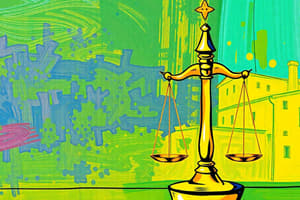Podcast
Questions and Answers
What is the main reason why defining law definitively is difficult?
What is the main reason why defining law definitively is difficult?
- Law is constantly evolving and changing.
- There is no consensus on the definition of law.
- Law is a prediction of what courts will decide, making it impossible to define precisely. (correct)
- Law is subjective and based on individual interpretation.
What distinguishes law from customs or conventions?
What distinguishes law from customs or conventions?
- Law is unchanging, while customs and conventions are constantly evolving.
- Law is intended to promote social justice, while customs and conventions are not.
- Law is enforced by formal institutions, while customs and conventions are not. (correct)
- Law is based on moral principles, while customs and conventions are not.
Which of the following is NOT a function of law in society, as described in the text?
Which of the following is NOT a function of law in society, as described in the text?
- To define the boundaries of acceptable behavior.
- To settle disputes between individuals and institutions.
- To allocate authority to enforce rules.
- To provide a framework for economic development. (correct)
What is a key difference between formal and informal methods of social control?
What is a key difference between formal and informal methods of social control?
Which of the following statements accurately reflects the concept of "codification" in relation to law?
Which of the following statements accurately reflects the concept of "codification" in relation to law?
What is the primary role of the courts in shaping the law?
What is the primary role of the courts in shaping the law?
Which of the following is NOT a key component of the working definition of law provided in the text?
Which of the following is NOT a key component of the working definition of law provided in the text?
What is the primary purpose of the "allocation of authority to coerce" as a function of law?
What is the primary purpose of the "allocation of authority to coerce" as a function of law?
What is the primary difference between Indigenous legal systems and Canadian legal traditions?
What is the primary difference between Indigenous legal systems and Canadian legal traditions?
Which of these is NOT a key feature of the common law system?
Which of these is NOT a key feature of the common law system?
In what way does the concept of land ownership differ between Indigenous legal traditions and European legal traditions?
In what way does the concept of land ownership differ between Indigenous legal traditions and European legal traditions?
What is the primary reason for the shift from informal customs to formal legal systems in transitional societies?
What is the primary reason for the shift from informal customs to formal legal systems in transitional societies?
Which of the following BEST exemplifies the relationship between law and social change?
Which of the following BEST exemplifies the relationship between law and social change?
What does the term 'precedent' refer to in the context of common law?
What does the term 'precedent' refer to in the context of common law?
Why is the concept of 'customs' significant in primitive/traditional societies?
Why is the concept of 'customs' significant in primitive/traditional societies?
Which of these is a key feature of the civil law system?
Which of these is a key feature of the civil law system?
What role do courts play in maintaining social order in modern societies?
What role do courts play in maintaining social order in modern societies?
What is the primary difference between the formal legal systems of modern societies and informal systems of primitive/traditional societies?
What is the primary difference between the formal legal systems of modern societies and informal systems of primitive/traditional societies?
Which of these is NOT a method of dispute resolution discussed in the content?
Which of these is NOT a method of dispute resolution discussed in the content?
What is the significance of the Royal Commission on Indigenous Peoples (1996) in relation to Indigenous legal systems?
What is the significance of the Royal Commission on Indigenous Peoples (1996) in relation to Indigenous legal systems?
How does Anishinabek Law differ from European legal traditions?
How does Anishinabek Law differ from European legal traditions?
Which of the following is NOT a reason why formal legal systems are necessary in modern societies?
Which of the following is NOT a reason why formal legal systems are necessary in modern societies?
Why is the transition from traditional societies to transitional societies significant in the development of legal systems?
Why is the transition from traditional societies to transitional societies significant in the development of legal systems?
Flashcards
Law
Law
A set of codified guidelines enforced by institutions.
Codified
Codified
Written down and explicit rules.
Components of Law
Components of Law
Three key elements: explicit rules, planned sanctions, and authorized personnel.
Function of Law
Function of Law
Signup and view all the flashcards
Social Control
Social Control
Signup and view all the flashcards
Allocation of Authority
Allocation of Authority
Signup and view all the flashcards
Settling Disputes
Settling Disputes
Signup and view all the flashcards
Social Change Promotion
Social Change Promotion
Signup and view all the flashcards
Informal Societies
Informal Societies
Signup and view all the flashcards
Dispute Settlement
Dispute Settlement
Signup and view all the flashcards
Social Change through Law
Social Change through Law
Signup and view all the flashcards
Primitive Legal Systems
Primitive Legal Systems
Signup and view all the flashcards
Transitional Legal Systems
Transitional Legal Systems
Signup and view all the flashcards
Modern Legal Systems
Modern Legal Systems
Signup and view all the flashcards
Indigenous Law
Indigenous Law
Signup and view all the flashcards
Common Law System
Common Law System
Signup and view all the flashcards
Civil Law System
Civil Law System
Signup and view all the flashcards
Legal Precedent
Legal Precedent
Signup and view all the flashcards
Dedicated Authority
Dedicated Authority
Signup and view all the flashcards
Oral Traditions
Oral Traditions
Signup and view all the flashcards
Mediation
Mediation
Signup and view all the flashcards
Legislation
Legislation
Signup and view all the flashcards
Judicial Decisions
Judicial Decisions
Signup and view all the flashcards
Study Notes
What is Law?
- Law is a set of codified guidelines, reflecting shared values and beliefs.
- It's enforced by institutions and aims to protect societal rights.
- Codified laws are explicit, written rules.
- Defining "law" precisely is difficult, as interpretations vary.
- Law is often viewed as predicting court decisions, given the discretionary nature of judgment.
- Our working definition of law includes explicit rules, enforced sanctions, and authorized personnel for creating, interpreting, and enforcing these rules.
- Law distinguishes itself from customs and conventions by being formalized, written, and enforceable.
- Enforcement of laws involves a structured system of application and upholding, like in Canada.
What Does Law Do?
-
Law's key functions (Hoebel's Law Jobs): Social control, allocation of authority, dispute settlement, and social change.
-
Social Control: Defines boundaries, sets expectations, helps predict behavior, and influences relationships between individuals and the state.
-
Allocating Authority: Enforcement requires authorized individuals or institutions, both formal and informal. Power can exist outside of formal legal structures.
-
Dispute Settlement: Resolves issues legally or non-legally, by considering facts and rights, through mediation or even violence. Legal solutions may not always resolve underlying conflicts.
-
Social Change: Adapts to changing values and societal needs, protecting societal values, responding to social issues, and evolving with time through law.
How Have Legal Systems Changed Over Time?
-
Legal Systems evolve, with differing typologies (ideal types for understanding situations):
-
Primitive/Traditional: Small, homogeneous communities relying on social pressure and customs.
-
Transitional: Expanding communities formalize rules to maintain order in larger, diverse environments.
-
Modern: Large, diverse populations depend on professionalized, written laws and specialized roles in enforcement and interpretation.
Different Sources/Origins of Law
-
Indigenous Law: Pre-colonial legal systems rooted in cosmology, emphasizing responsibilities, oral traditions, and holistic views of the environment. Example: Anishinabek Law.
-
Common Law System (Used in most of Canada, originating in the UK):Based on judicial decisions created over time from cases, with precedent-based rulings (Inductive Reasoning, Binding Precedents.)
-
Civil Law System (Used in Quebec, originating in Roman/Napoleonic Law Systems): Based on written codes (Deductive Reasoning, Binding written codes.)
Studying That Suits You
Use AI to generate personalized quizzes and flashcards to suit your learning preferences.




